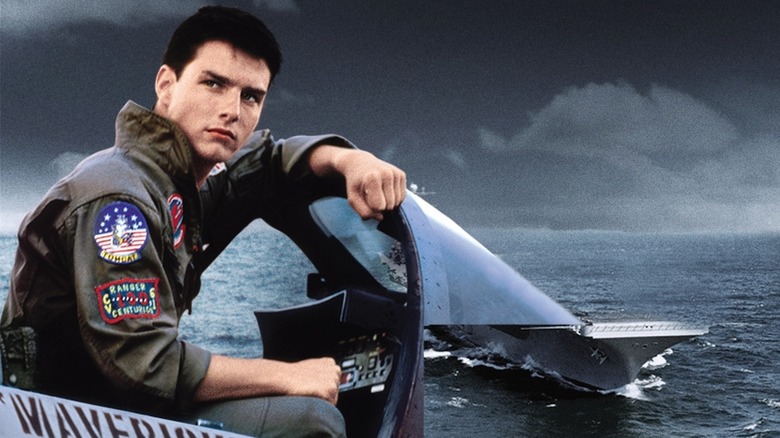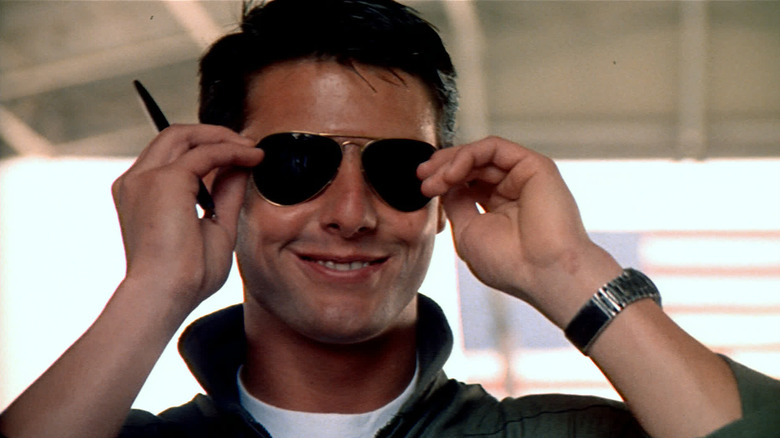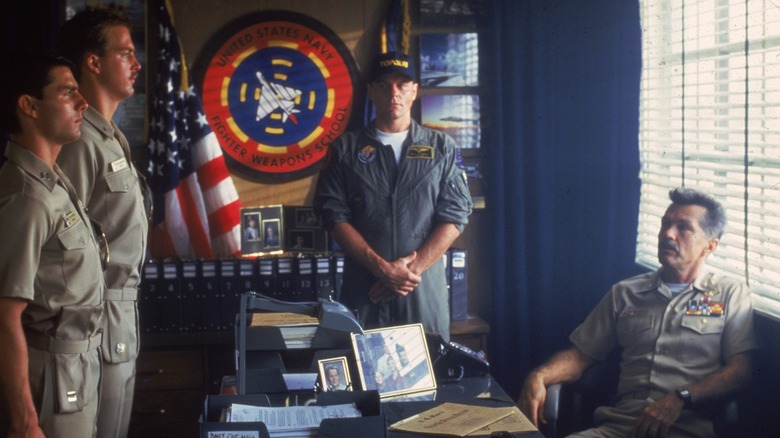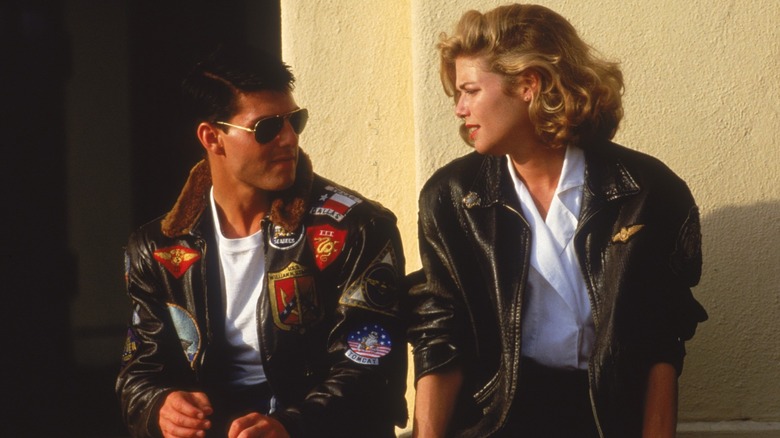Tales From The Box Office: Top Gun Propelled Tom Cruise To Superstardom
When one thinks of the words "movie" and "star" in combination, there are perhaps a few names and faces that will come to mind. Near, or at the very top, of that list for people in North America (and quite likely around the world) is Tom Cruise. Cruise has been a brand unto himself for just shy of four decades now, dating back to his breakout 1983 performance in "Risky Business." It's true that movie put him on the map in a meaningful way, but if there is one defining moment in his career as it pertains to becoming the superstar we know today, it's "Top Gun."
In the summer of 1986, a movie about a group of elite fighter pilots hit theaters and, like the Energizer bunny, kept going and going until, by the end of that same summer, it was clear that Cruise was more than just a star with potential — he had the promise to be in a league of his own. Some 36 years later with that movie's long-awaited sequel, "Top Gun: Maverick" now in theaters, it is safe to say that Cruise is indeed in a league of his own.
In honor of the sequel's release, we're going to look back at the original "Top Gun," the fact that Cruise wasn't originally supposed to be in it, how it became a gigantic hit in a way that simply wouldn't be possible today, and how it set up a string of successes that Cruise has been riding ever since, with only the occasional misfire over the course of the last three decades and change. Let's dig in.
The movie: Top Gun
The Cold War was still very much a thing in the '80s and that meant a whole lot of filmmaking was influenced by those happenings. It also meant that some anti-Soviet sentiment was going to creep into movies that were being made at the time. "Top Gun" is no exception. That is important as it, in a roundabout way, gave Cruise arguably the most defining role of his career. Without "Top Gun," would Cruise have become Ethan Hunt leading the "Mission: Impossible" movies for more than 25 years? Would he have become a three-time Oscar-nominated actor? It's tough to say. What we know for sure is that Cruise, despite being a rising star at the time, was not the first choice to play Maverick. The "Taps" star only ended up in a position to play the role of Maverick after Matthew Modine passed.
Indeed, Modine was offered the role first, having starred in movies such as "Private School" and "Vision Quest" prior to his would-be role in one of the biggest blockbusters of the '80s. So, why on Earth did Modine turn down the role in a production from director Tony Scott and mega-producer Jerry Bruckheimer? He wanted to star in Stanely Kubrick's "Full Metal Jacket," a radically different kind of war movie, instead. In an interview from 2020, the actor explained, saying:
"I wanted to tell the story about human behavior and what the war does to individuals, our youth and how the scars that people receive from combat are not always physical. I thought it was a much more important story to me than telling the story about pointing the finger at the Russians and saying that they were the bad guy."
Modine has gone on to have a fine career and "Full Metal Jacket" is an unquestioned classic. Most actors would kill to star in a movie like that, so it's hard to say he made the wrong choice, it's just that his choice opened up the door for Cruise to slip through. On the other side of that door? Movie stardom that likes of which only a very small number of people who have ever lived on this planet will ever know.
The financial journey
"Top Gun" originally hit theaters on May 16, 1986, playing on just over 1,000 screens in North America. The reviews at the time could be best described as mixed from critics and the opening weekend box office sort of speaks to that. The film debuted atop the charts in its opening weekend with a mere $8.1 million, topping of "Short Circuit" and "The Money Pit." Even adjusted for inflation, that's still only around $21 million in today's money, which would hardly be considered a big hit by summer blockbuster standards. But then word of mouth kicked in and the ludicrously successful flight this film took that summer was set in motion.
In modern times, you pretty much get one weekend then another big movie comes to town. The drops are steep and tough to take. The '80s were a radically different time, however, and a movie could play in theaters for months, drawing in moviegoers week after week. That's exactly what happened with "Top Gun." It actually increased its earnings to $9.4 million the following weekend, Memorial Day weekend, to $9.4 million. It eventually expanded to more than 1,500 screens in the coming weeks. It was dropping in many cases just 8% or 9% from week to week. It was an old-school hit of the highest order.
All told, "Top Gun" has earned $180 million domestically to date to go along with $177 million internationally for a grand total of $357.4 million. Considering its reported $15 million production budget, that is a downright stupifying return on investment. Especially when we consider that the soundtrack, largely propelled by Kenny Loggins' "Danger Zone," was a gigantic hit in its own right that summer and has sold more than 12 million copies. Adjust for inflation, the movie remains Cruise's biggest domestic hit ever at around $460 million, give or take. Beyond that, it turned Cruise into a global star capable of drawing in crowds worldwide, something he's still doing as good as anyone to this day.
The lessons contained within
First and foremost, the way in which "Top Gun" made its money seems downright prehistoric in the modern era. When we think about the fact that "Top Gun: Maverick" will be streaming from the comfort of home on Paramount+ a mere 45 days after its initial theatrical release, it becomes incredibly difficult to even compare circumstances. Movies are hardly ever afforded the chance to breathe in the moviegoing marketplace as it exists. Granted, there is a lot of competition in any given summer now and that means lots of big movies vying for those screens. Still, there is something to be said for the idea of giving certain movies a chance to find their audience. Just look at what is happening with "Everything Everywhere All At Once" right now. Look at "The Greatest Showman." There is value in finding ways to allow audiences to find a film in theaters. Its cultural impact is so much greater in the long-run when a movie is a theatrical hit.
Another gigantic shift that has been going on for some time now is that movie stars alone can no longer sell a movie in most cases. Dwayne "The Rock" Johnson is an exception, not the rule. Tom Holland is a star, sure, but he can't sell any movie because his name is on the poster. In acknowledging that Cruise is a pretty complicated enigma as a person, it is still safe to say that cinema has almost certainly been better off with him in it for the past several decades. That superstardom has carried so much on its back. That rising tide has lifted many boats. Is there a way to manufacture the preservation of the movie star in the way we used to know it? Probably not. But Hollywood surely would be far less interesting without Tom Cruise in it, and there probably won't be a next Tom Cruise.
What will the circus that is the movie business look like without global superstars capable of carrying blockbusters single-handedly? I'm sure I do not know, but I know it will be missing something.



